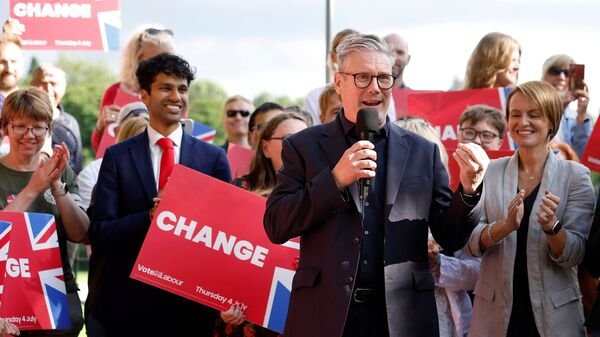YOU WOULD never know it from a low-wattage campaign but after 14 years of Conservative rule, Britain is on the threshold of a Labour victory so sweeping that it may break records. No party fully subscribes to the ideas that The Economist holds dear. The economic consensus in Britain has shifted away from liberal values—free trade, individual choice and limits to state intervention. But elections are about the best available choice and that is clear. If we had a vote on July 4th, we, too, would pick Labour, because it has the greatest chance of tackling the biggest problem that Britain faces: a chronic and debilitating lack of economic growth.
Consider first the alternatives. We can discard some immediately. The Scottish National Party wants to dismember Britain, not run it. The Greens make student politics look rigorous. Reform UK, Nigel Farage’s outfit, offers a fevered, nativist vision of Britain that would accelerate the very decline it says it is striving to prevent.
What of the Liberal Democrats? The logic that led us to endorse them in 2019 no longer holds. Against Boris Johnson’s Brexit-obsessed Tories and Labour under Jeremy Corbyn, a hard-left charisma vacuum, they were the only choice. Today the Lib Dems still have some good policies—letting asylum-seekers work, say, or a new land-value tax—but they have become more sceptical on trade and even more nimbyish on planning. The Lib Dems do not aspire to be a credible party of government; they are barely credible as liberals.
Trying to make the case for the Tories is like a teacher struggling to say something nice about the class troublemaker. They have done some good things: on educational standards, on regional devolution and on the tax regime for capital investment. Rishi Sunak is a better prime minister than Liz Truss, though if praise came any fainter it would be invisible. The pandemic and the invasion of Ukraine—where they also did well—vastly complicated their time in office.
But the other side of the ledger is long and damning. The public realm has been hollowed out. Prisons are full; local government is badly underfunded; and if the National Health Service is still a national treasure, that may be because treatment is so hard to find. On migration, the Tories are illiberal and ineffective: they want to crack down on it yet have presided over record levels of net migration. They have become increasingly hostile to policies designed to combat climate change. Above all, they have failed to build. Housing supply lags behind demand, and grid connections take years to materialise.
The Tories’ most memorable policy is to have severed the country from its biggest trading partner. That was always going to be bad for Britain, but the chaos of enacting Brexit split the party and voters have had to endure the Tory psychodrama ever since. Each prime minister has undone the work of the previous one. The party has neglected its prosperous voters in the south-east. From drinking sessions in Downing Street during the pandemic to bets allegedly placed on the timing of the election, a film of sleaze clings to the Conservatives.
Although the Tory party does not deserve our endorsement, wishing its obliteration would be wrong. The British electorate has become more volatile. The political pendulum could swing away from Labour within a single five-year term. Whenever it does so, Britain will need a capable opposition party to offer an alternative. A Tory catastrophe and a strong showing for Mr Farage, who dreams of staging a reverse Tory takeover, would heighten the risk that the Conservatives lurch towards a dark, populist extreme. Britain needs the party to rediscover its conservative, pro-market instincts.
That is the negative case for voting Labour, but there are positive arguments, too. The first is that the party has been transformed. Since the last election Sir Keir Starmer has expelled Mr Corbyn, rooted out many of his fellow travellers and dragged Labour away from radical socialism. The Economist disagrees with the party on many things, such as its plan to create a publicly owned energy provider. But elections are when voters mete out rewards as well as punishments, and Labour’s reinvention deserves credit.
(Except for the headline, this story has not been edited by Universal Times Magazine staff and is published from a syndicated feed.)
(Press the bell 🔔 Icon, for all latest updates)






